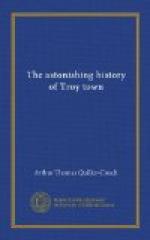Caleb stopped rowing, and leant forward on his paddles.
“These ’ere leppards in time got to be quite a happy famb’ly—’cept, of course, they warn’t happy, ‘cos nobody wudn’ have nuthin’ to say to ’em. Well, the story goes as one on ’em got falled in love wi’ by a very nice gal down in Troy, and one fine day she ups an’ tells her sorrowin’ parents that she’s agoin’ to marry a leppard. ’Not ef we knows et,’ says they; ‘we forbids the banns’; and wi’ that they went off to bed thinkin’ as they’d settled et. ‘But,’ says Parson Lasky—”
“Who was he?” interrupted Mr. Fogo.
“On’y a figger o’ speech, sir, and nothin’ to do wi’ the yarn, as the strollin’ actor said when his theayter cotched a-fire. Wot I meant was, that very night the gal gets a boat an’ rows up to Kit’s House, arter leavin’ a letter to say as she’d drownded hersel’. An’ there she lived in hidin’, ‘long wi’ the leppards for the rest of her days, which, by the tale, warn’t many, an’ she an’ her sweetheart was berried in wan grave.” Caleb paused for breath.
“And the ghosts?” said Mr. Fogo, much interested.
“Some ha’ seed her rowin’ about here in a boat, o’ dark nights; and others swear to seein’ all the leppards a-marchin’ down wi’ her corpse to the berryin’-ground. Leastways, that’s the tale. Jan Spettigue was the last as seed ’em, but as he be’eld three devils on his own chimbly-piece the week arter, along o’ too much rum, p’r’aps he made a mistake. Anyways, ‘tes a moral yarn, an’ true to natur’. These young wimmen es a very detarmined sex, whether ’tes a leppard in the case or a Rooshan.”
Mr. Fogo had fallen into a reflective silence.
“’Tes a thousand pities this ‘ere place should be empty, wi’ a lean-to Crystal Pallis—by which I means a conserva-tory, sir—an’ gardens, an’ room for a cow, an’ a Pyll o’ ets own—”
“A what?”
“Pyll, sir, otherwise a creek—’c, r, double e, k—an arm o’ the sea,’ as the spellin’ book says.”
A curious fascination stole over Mr. Fogo as he looked earnestly at the house round which these memories hung. Standing on an angle formed by the bending river, and the little creek, and behind a screen of trees—elms almost too old to feel the sap of spring, a chestnut or two, and a few laurels and sombre firs, that had cracked with their roots the grey garden wall and sprawled down to the beach below—the stained and yellow frontage looked down towards the busy harbour, as it seemed with a sense of serene decay, haunted but without disquietude, like the face of an old lady who has memories and lives in them, though she deigns to contemplate a life from which her hopes, with her old friends and lovers, have dropped out. Perhaps Mr. Fogo had some sympathy with this mood; for Caleb, after waiting some time for his reply, took to his paddles again with a will, and presently the boat, sweeping round a projecting rock, passed into a very different scene.




